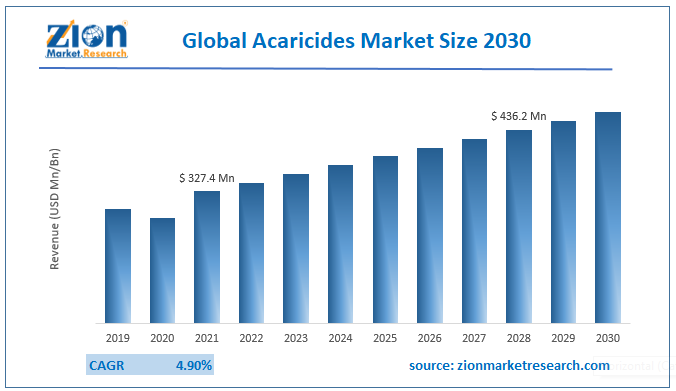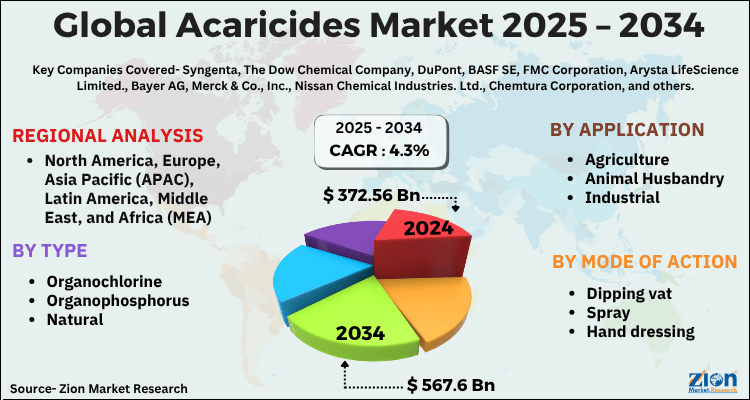Global Acaricides Market Size, Share, Growth Analysis Report - Forecast 2034

Acaricides Market By Type (Organophosphate acaricides, Organochlorine acaricides, Carbamates, Synthetic pyrethroids), By Application (Agriculture, Animal husbandry, Industrial, Others), By Mode of Action (Dipping vat, Spray, Hand dressing, Others), and By Region: Global and Regional Industry Overview, Market Intelligence, Comprehensive Analysis, Historical Data, and Forecasts 2025 - 2034
| Market Size in 2024 | Market Forecast in 2034 | CAGR (in %) | Base Year |
|---|---|---|---|
| USD 372.56 Million | USD 567.6 Million | 4.3% | 2024 |
Global Acaricides Market: Industry Perspective
The global acaricides market size was worth around USD 372.56 Million in 2024 and is predicted to grow to around USD 567.6 Million by 2034 with a compound annual growth rate (CAGR) of roughly 4.3% between 2025 and 2034. The report analyzes the global acaricides market's drivers, restraints/challenges, and the effect they have on the demands during the projection period. In addition, the report explores emerging opportunities in the acaricides industry.
Global Acaricides Market: Overview
Chemicals called acaricides are used to eradicate ticks and mites. Additionally, they help to increase productivity by maintaining the health and disease-free status of the crops and animals. Some acaricides contain carbamates, arsenic, synthetic pyrethroids, chlorinated hydrocarbons, and organophosphates. Several varieties of acaricides exist depending on the proportion of various chemicals, including chlorine, zinc, phosphorous, and tin. Acaricides can also be produced using natural ingredients, including damaged corn, clove, and neem.
These acaricides that are created naturally tend to be less harmful. Acaricides made from chemicals typically contain organochlorine and organophosphorus. The use of acaricides is expanding due to their effectiveness and simplicity in eliminating mites and ticks, which protects cattle and agricultural products. With their quickly expanding populations and swifter economic development, emerging markets like Brazil, India, and China have progressively expanded their crop/grain and meat consumption. The growth of the global acaricides market is anticipated to be significantly influenced by the rise in meat consumption. Acaricides Market is hampered by the high cost of raw materials and stringent government regulations.
Global Acaricides Market: Growth Drivers
Increasing crop productivity will drive the growth of the market
The need to feed a constantly expanding population, dwindling arable land, and increased demand for sustainable agricultural techniques are some key factors driving the increase in demand for acaricides or miticides. Crop production is expected to quadruple over the following few years to satisfy demand from the expanding population, which would lead to an increase in the use of acaricides. Technology will undoubtedly play a significant part in creating acaricide products, as is envisaged. Farmers are encouraged to use efficient crop protection strategies by rising urbanization and decreased access to fertile land. Pesticides can have disastrous effects that greatly diminish or even destroy subsequent crops. As a result, farmers all over the world frequently use acaricide as a control measure to get rid of undesirable effects. Since crop yield is rising, it is also important to protect the crops against pests and plant diseases. As a result, it is predicted that acaricide demand will increase during the projection period.
Restraints
Different acaricide effects would impact market growth
Unfortunately, when a pesticide, like an acaricide, is sprayed to the surface, it moves through the air, soil, or water outside of its designated region of usage. This may result in less effective pest management, surface & groundwater pollution, and harm to organisms other than the intended target, such as people. Acaricide can have both acute or short-term negative health consequences and chronic, or long-term, negative health impacts, which can happen months or years after exposure. Acute health impacts include stinging eyes, blindness, blisters, nausea, rashes, disorientation, diarrhea, and even death. Therefore, additional barriers to the growth of the global acaricide market will be created by the different negative effects of acaricides on humans and the environment.
Key Insights
- As per the analysis shared by our research analyst, the global acaricides market is estimated to grow annually at a CAGR of around 4.3% over the forecast period (2025-2034).
- Regarding revenue, the global acaricides market size was valued at around USD 372.56 Million in 2024 and is projected to reach USD 567.6 Million by 2034.
- The acaricides market is projected to grow at a significant rate due to rising demand for pest control in agriculture, increasing prevalence of tick-borne diseases, and growing livestock production.
- Based on Type, the Organophosphate acaricides segment is expected to lead the global market.
- On the basis of Application, the Agriculture segment is growing at a high rate and will continue to dominate the global market.
- Based on the Mode of Action, the Dipping vat segment is projected to swipe the largest market share.
- Based on region, Asia-Pacific is predicted to dominate the global market during the forecast period.
Global Acaricides Market: Report Scope:
| Report Attributes | Report Details |
|---|---|
| Report Name | Acaricides Market |
| Market Size in 2024 | USD 372.56 Million |
| Market Forecast in 2034 | USD 567.6 Million |
| Growth Rate | CAGR of 4.3% |
| Number of Pages | 240 |
| Key Companies Covered | Syngenta, The Dow Chemical Company, DuPont, BASF SE, FMC Corporation, Arysta LifeScience Limited., Bayer AG, Merck & Co., Inc., Nissan Chemical Industries. Ltd., Chemtura Corporation, and others. |
| Segments Covered | By Type, By Application, By Mode of Action, and By Region |
| Regions Covered | North America, Europe, Asia Pacific (APAC), Latin America, The Middle East and Africa (MEA) |
| Base Year | 2024 |
| Historical Year | 2020 to 2023 |
| Forecast Year | 2025 - 2034 |
| Customization Scope | Avail customized purchase options to meet your exact research needs. Request For Customization |
Global Acaricides Market: Segmentation
The global acaricides market has been segmented into type, application, mode of application, and region. All the segments have been analyzed based on present and future trends and the market is estimated from 2025 to 2034.
Based on type, the worldwide acaricides market is segmented into organochlorine, organophosphorus, natural, and others. In 2024, organophosphorus compounds held the biggest market share for acaricides. Organic compounds with phosphorus are known as organophosphorus compounds. As an alternative to chlorinated hydrocarbons that linger in the environment, they are largely utilized in insect management. Some of the chemicals made of organophosphorus are powerful pesticides. These substances make up a sizable fraction of all pesticides applied globally, including those applied to food crops.
Based on application, the global acaricides market is segmented into agriculture, animal husbandry, industrial, and others. The agriculture industry dominated the market for acaricides in 2024. Acaricides and miticides for agriculture are insecticides used to eradicate mites and ticks. Acaricides are used in crop protection techniques to combat phytophagous mites and pests that economically harm crops and ornamental plants.
By Mode of Action, the global acaricides market is split into Dipping vat, Spray, Hand dressing, Others.
The Regional, this segment includes the current and forecast demand for North America, Europe, Asia Pacific, Latin America,and the Middle East and Africa.
Recent Developments
- In February 2024, Oroganic, a new insecticide/acaricide from Oro Agri, was introduced at HortiContact in Gorinchem, the Netherlands. It is a phytosanitary preparation with insecticidal, acaricidal, and fungicidal qualities made from orange oil that is 6 percent. It effectively and sustainably combats illnesses and pests like powdery mildew, mildew, or thrips. Vegetables, top fruits, and vines were among the numerous crops on which the product was permitted.
Global Acaricides Market: Regional Landscape
The acaricides market shows strong regional variation, with Asia-Pacific emerging as a key growth hub due to expanding agricultural activities, rising pest management needs, and increasing awareness among farmers, particularly in countries like China and India. North America holds a significant share, driven by advanced farming practices, stringent regulations on crop protection, and high demand from the livestock industry for mite and tick control. Europe also contributes substantially, supported by technological advancements in pest management and a growing focus on sustainable agriculture, despite regulatory restrictions on certain chemical acaricides. Meanwhile, regions like Latin America and the Middle East & Africa are witnessing gradual growth, fueled by the expansion of agricultural lands and increasing investment in crop protection solutions to boost yields and safeguard livestock health.
Global Acaricides Market: Competitive Analysis
The report provides a company market share analysis to give a broader overview of the key market players. In addition, the report also covers key strategic developments of the market, including acquisitions & mergers, new product launches, agreements, partnerships, collaborations & joint ventures, research & development, and regional expansion of major participants involved in the acaricides market on a global and regional basis.
The global acaricides market is dominated by players like:
- Syngenta
- The Dow Chemical Company
- DuPont
- BASF SE
- FMC Corporation
- Arysta LifeScience Limited.
- Bayer AG
- Merck & Co. Inc.
- Nissan Chemical Industries. Ltd.
- Chemtura Corporation
Global Acaricides Market: Segmentation Analysis
The global acaricides market is segmented as follows;
By Type
- Organochlorine
- Organophosphorus
- Natural
- Others
By Application
- Agriculture
- Animal Husbandry
- Industrial
- Others
By Mode of Action
- Dipping vat
- Spray
- Hand dressing
- Others
Global Acaricides Market: Regional Segment Analysis
- North America
- The U.S.
- Canada
- Mexico
- Europe
- France
- The UK
- Spain
- Germany
- Italy
- Rest of Europe
- Asia Pacific
- China
- Japan
- India
- Australia
- South Korea
- Rest of Asia Pacific
- The Middle East & Africa
- Saudi Arabia
- UAE
- Egypt
- Kuwait
- South Africa
- Rest of the Middle East & Africa
- Latin America
- Brazil
- Argentina
- Rest of Latin America
Table Of Content
Methodology
FrequentlyAsked Questions
Chemicals called acaricides are used to eradicate ticks and mites. Additionally, they help to increase productivity by maintaining the health and disease-free status of the crops and animals. Some acaricides contain carbamates, arsenic, synthetic pyrethroids, chlorinated hydrocarbons, and organophosphates. Several varieties of acaricides exist depending on the proportion of various chemicals, including chlorine, zinc, phosphorous, and tin. Acaricides can also be produced using natural ingredients, including damaged corn, clove, and neem.
The Global acaricides market is expected to grow due to increasing need for enhanced crop productivity and food security due to a rising Global population, growing concerns over tick and mite infestations in both agriculture and animal husbandry, and increasing demand for sustainable and bio-based pest control.
According to a study, the Global acaricides market size was worth around USD 372.56 Million in 2024 and is expected to reach USD 567.6 Million by 2034.
The Global acaricides market is expected to grow at a CAGR of 4.3% during the forecast period.
Asia-Pacific is expected to dominate the acaricides market over the forecast period.
Leading players in the Global acaricides market include Syngenta, The Dow Chemical Company, DuPont, BASF SE, FMC Corporation, Arysta LifeScience Limited., Bayer AG, Merck & Co., Inc., Nissan Chemical Industries. Ltd., Chemtura Corporation, among others.
The report explores crucial aspects of the acaricides market, including a detailed discussion of existing growth factors and restraints, while also examining future growth opportunities and challenges that impact the market.
RelatedNews
HappyClients
Zion Market Research
Tel: +1 (302) 444-0166
USA/Canada Toll Free No.+1 (855) 465-4651
3rd Floor,
Mrunal Paradise, Opp Maharaja Hotel,
Pimple Gurav, Pune 411061,
Maharashtra, India
Phone No +91 7768 006 007, +91 7768 006 008
US OFFICE NO +1 (302) 444-0166
US/CAN TOLL FREE +1 (855) 465-4651
Email: sales@zionmarketresearch.com
We have secured system to process your transaction.
Our support available to help you 24 hours a day, five days a week.
Monday - Friday: 9AM - 6PM
Saturday - Sunday: Closed







